Related Research Articles
Summer and Smoke is a two-part, thirteen-scene play by Tennessee Williams, completed in 1948. He began working on the play in 1945 as Chart of Anatomy, derived from his short stories "Oriflamme" and the then-work-in-progress "Yellow Bird." The phrase "summer and smoke" probably comes from the Hart Crane poem "Emblems of Conduct" in the 1926 collection White Buildings. After a disappointing Broadway run in 1948, the play was a hit Off-Broadway in 1952. Williams continued to revise Summer and Smoke in the 1950s, and in 1964 he rewrote the play as The Eccentricities of a Nightingale.
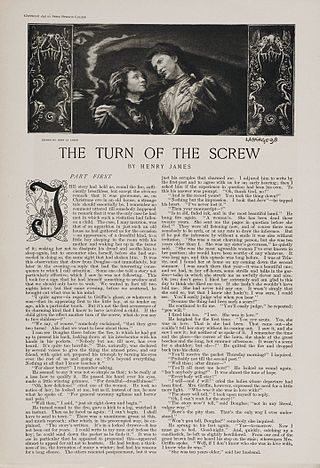
The Turn of the Screw is an 1898 horror novella by Henry James which first appeared in serial format in Collier's Weekly. In October 1898, it was collected in The Two Magics, published by Macmillan in New York City and Heinemann in London. The novella follows a governess who, caring for two children at a remote estate, becomes convinced that the grounds are haunted. The Turn of the Screw is considered a work of both Gothic and horror fiction.
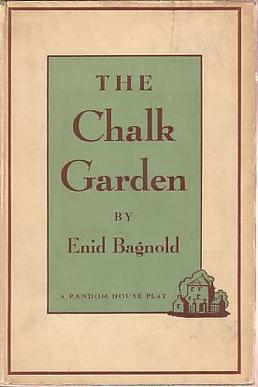
The Chalk Garden is a play by Enid Bagnold that premiered in the US in 1955 and was produced in Britain the following year. It tells the story of the imperious Mrs St Maugham and her granddaughter Laurel, a disturbed child under the care of Miss Madrigal, a governess, whose past life is a mystery that is solved during the action of the play. The work has been revived numerous times internationally, and was adapted for the cinema in 1964.

The Heidi Chronicles is a 1988 play by Wendy Wasserstein. The play won the 1989 Pulitzer Prize for Drama.

The Innocents is a 1961 gothic psychological horror film directed and produced by Jack Clayton, and starring Deborah Kerr, Michael Redgrave, and Megs Jenkins. Based on the 1898 novella The Turn of the Screw by the American novelist Henry James, the screenplay was adapted by William Archibald and Truman Capote, who used Archibald's own 1950 stage play—also titled The Innocents—as a primary source text. Its plot follows a governess who watches over two children and comes to fear that their large estate is haunted by ghosts and that the children are being possessed.
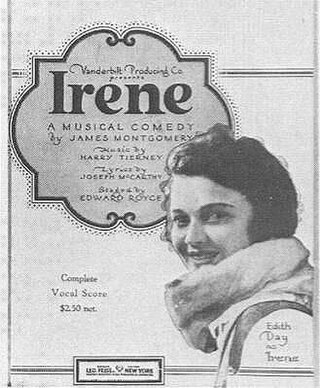
Irene is a musical with a book by James Montgomery, lyrics by Joseph McCarthy, and music by Harry Tierney. Based on Montgomery's play Irene O'Dare, it is set in New York City's Upper West Side and focuses on immigrant shop assistant Irene O'Dare, who is introduced to Long Island's high society when she is hired by one of its leading grande dames to help redecorate her home.
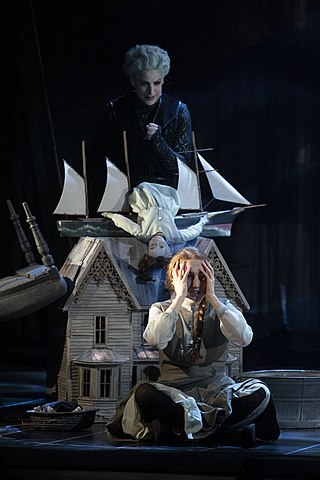
The Turn of the Screw is a 20th-century English chamber opera composed by Benjamin Britten with a libretto by Myfanwy Piper, "wife of the artist John Piper, who had been a friend of the composer since 1935 and had provided designs for several of the operas". The libretto is based on the 1898 novella The Turn of the Screw by Henry James. The opera was commissioned by the Venice Biennale and given its world premiere on 14 September 1954, at the Teatro La Fenice, Venice. The original recording was made during January of the next year, with the composer conducting.
Pauline Flanagan was an Irish-born actress who had a long career on stage, she was best known in the United States for her role as Annie Colleary, on the television soap opera Ryan's Hope in 1979 and again in 1981. She later returned to the show as Sister Mary Joel.
Joseph "Jo" Mielziner was an American theatrical scenic, and lighting designer born in Paris, France. He was described as "the most successful set designer of the Golden era of Broadway", and worked on both stage plays and musicals.
Peter Cookson was an American stage and film actor of the 1940s and 1950s. He was known for his collaborations with his wife, Beatrice Straight, an actress and member of the Whitney family.
Everything in the Garden is a play by Giles Cooper, first produced by The Royal Shakespeare Company in 1962 in London.
The Ritz is a comedic farce by Terrence McNally. Rita Moreno won a Tony Award for her performance as Googie Gomez in the 1975 Broadway production, which she and many others of the original cast reprised in a 1976 film version directed by Richard Lester.
Peter Glenville was an English film and stage actor and director.
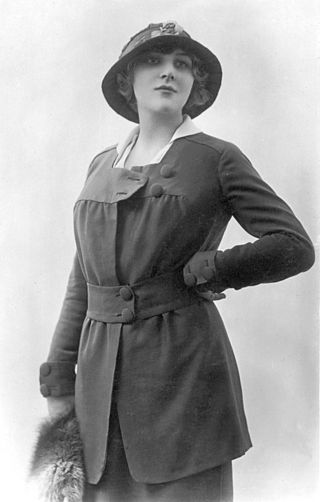
Isobel Elsom was an English film, theatre, and television actress. She was often cast as aristocrats or upper-class women.

Look Homeward, Angel is a 1957 stage play by the playwright Ketti Frings. The play is based on Thomas Wolfe's 1929 largely autobiographical novel of the same title.

The Nightcomers is a 1971 British horror film directed by Michael Winner and starring Marlon Brando, Stephanie Beacham, Thora Hird, Harry Andrews and Anna Palk. It is a prequel to Henry James' 1898 novella The Turn of the Screw, which had already been adapted into the 1961 film The Innocents. The manor house in the film is Sawston Hall, a 16th-century Tudor manor house in Sawston, Cambridgeshire.
All Over is a two-act play written in 1970 by Edward Albee. He had originally developed it in 1967 as a short play entitled Death, the second half of a projected double bill with another play called Life.

The Turn of the Screw is a British television film based on Henry James's 1898 ghost story of the same name. Commissioned and produced by the BBC, it was first broadcast on 30 December 2009, on BBC One. The novella was adapted for the screen by Sandy Welch, and the film was directed by Tim Fywell. Although generally true to the tone and story of James's work, the film is set in the 1920s—in contrast to the original 1840s setting—and accentuates sexual elements that some theorists have identified in the novella. The film's story is told in flashbacks during consultations between the institutionalised Ann and Dr Fisher. Ann tells how she was hired by an aristocrat to care for the orphans Miles and Flora. She is met at the children's home, Bly, by Mrs Grose, the housekeeper. Ann soon begins to see unknown figures around the manor, and seeks an explanation.
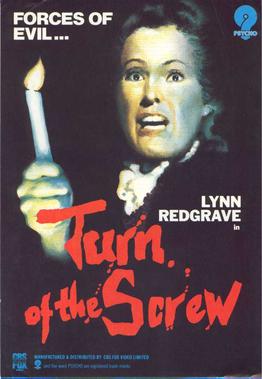
The Turn of the Screw is a 1974 American made-for-television horror film directed by Dan Curtis based on the 1898 novella of the same name by Henry James. The film aired on ABC on April 15, 1974.
"The Turn of the Screw" was an American television movie broadcast by NBC on October 20, 1959, as the third episode of the television series, Ford Startime. It was written by James Costigan as an adaptation of Henry James' novella of the same name. John Frankenheimer was the director and producer.
References
The Best Plays of 1976-1977. New York City: Dodd, Mead and Company. 1977. p. 295. ISBN 0-396-07501-0.